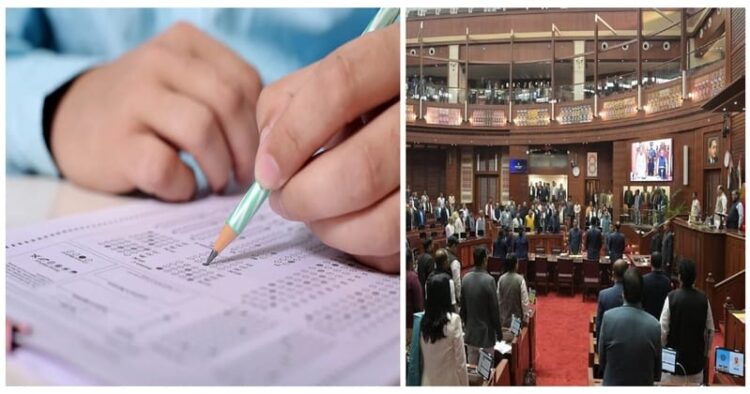In a significant move to fortify the fight against malpractices in recruitment exams, the Assam Public Examination (Measures for Prevention of Unfair Means in Recruitment) Bill, 2024 has been successfully passed. This legislation empowers the government with the authority to impose severe punishments on individuals involved in creating, leaking, selling, printing, or solving questions to facilitate easier passage for candidates.
The new law aims to establish a robust framework that ensures the integrity of recruitment examinations, addressing concerns related to cheating, question paper leaks, and other unfair means. By granting the government the power to penalise not only those facilitating cheating but also examinees involved in such activities, the legislation sends a clear message against any form of dishonesty in the examination process.
For individuals found guilty of indulging in any unfair recruitment exam methods, the bill outlines harsh penalties. One important clause sets a minimum five-year prison sentence, with a maximum of ten years in prison, for anyone who performs malpractice. A fine between Rs 10 lakh to Rs 10 crore maximum might be imposed on violators in addition to jail custody.
Financial responsibility is emphasized by the law, which states that nonpayment of the stipulated fine could result in an extra two-year prison sentence for the defaulting party.
Repercussions for Examinees and Features of the Legal Framework
Assam Assembly Bill is noteworthy because examinees who use unfair tactics will have to serve a maximum of 3 years in jail. In addition, if they fail to pay, they risk a minimum fine of Rs 1 lakh and an additional nine months in jail. This clause aims to discourage examinees from using unethical techniques during exams.
All offenses are classified by the bill as cognizable, non-bailable, and non-compoundable, emphasizing the seriousness of these violations. Officers at the rank of Deputy Superintendent of Police or higher are authorized by law to investigate certain crimes in order to guarantee comprehensive investigations in this matter. Also, in order to improve the effectiveness and neutrality of the legal system, this investigation authority will be strategically distributed.
The bill also ensures that law enforcement personnel who carry out their responsibilities diligently will be protected from any legal repercussions, if any.
In the Assam assembly bill, Chief Minister Himanta Biswa Sarma explained that the main goal is to give government agencies, boards, corporations, and autonomous bodies an effective way to prevent and stop question paper leaks along with the unfair recruiting practices.
Two more State-run Universities in the districts of Sonitpur and Kokrajhar are also part of the legislative agenda. In Gohpur, Sonitpur district, a teaching, residential, and affiliated university will be established, according to the Swahid Kanaklata Barua State University Bill, 2024. The Kokrajhar University Bill, 2024, stipulates that Kokrajhar Government College will be upgraded to the rank of semi-residential, teaching, research-focused, affiliated university, along with an open and distance learning centre.
Reform of the Educational System
A revolutionary shift in the education system was announced when the Assam assembly enacted the Assam State School Education Board Bill, 2024, coinciding with the focus on exam integrity. The Assam State School Education Board has been created by this measure, which also unites the Assam Higher Secondary Education Council (AHSEC) and the Board of Secondary Education, Assam (SEBA). It will no longer be involved in curriculum decisions or institution assessments, as the new board will only be in-charge of exams and credential issuance up to class 12.
Ultimately, the legislative measures that Assam has recently introduced demonstrate a thorough dedication of eliminating recruitment exam misconduct and reviving the educational system. The implementation of strict policies in addition to the founding of new educational facilities highlights the commitment of the government to promoting an open and strong framework for academic endeavours as well as hiring procedures.




















Comments